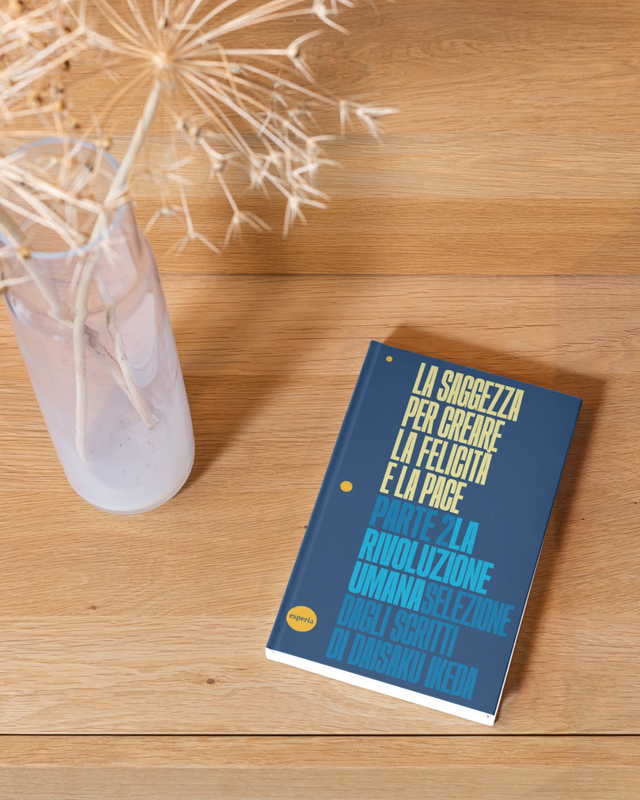
Libri e riviste
-

Esperia La creazione di valore
La figura di Tsunesaburo Makiguchi, primo presidente e fondatore della Soka Gakkai, viene rievocata in un saggio che ne mette in evidenza le doti di insegnante, educatore e leader religioso. Le sue opere rivelano la profondità della sua preparazione culturale e una grande compassione per il prossimo, difese sino alla morte in un ambiente culturalmente retrivo e all'interno di un clima politico repressivo.
€15,90
-

Esperia Una rivoluzione della leadership
Raccolta degli incoraggiamenti di Daisaku Ikeda ai responsabili della Soka Gakkai negli anni tra il 2004 e il 2008."Piuttosto che giudicare le persone come capaci o incapaci, è meglio cercare i punti di forza di ognuno. La crescita di persone capaci dipende dalla determinazione dei responsabili."Negli incoraggiamenti rivolti negli ultimi anni ai responsabili centrali della Soka Gakkai, Daisaku Ikeda individua le caratteristiche per espandere il movimento di kosen rufu nel futuro. Il messaggio che emerge sopra tutti gli altri è che "ciò che conta è il cuore".
€9,00
-

IBISG 948 Nuovo Rinascimento con inserto B&S - GENNAIO 2026
NUOVO PROGETTO EDITORIALE - da Gennaio 2026 Il Nuovo Rinascimento, 44 pagine, mensile, ilnuovorinascimento.orgBuddismo e Società, 36 pagine, bimestrale, buddismoesocieta.org La prima pubblicazione dell’Istituto Buddista Italiano Soka Gakkai, nata nel febbraio del 1982, avrà una nuova versione cartacea di 44 pagine (a fronte delle attuali 32 della NR Selezione) e adotterà il formato attuale di Buddismo e società. Sarà quindi una rivista totalmente rinnovata, con un maggior numero di pagine e varietà di contenuti, uscirà ogni mese e presenterà tutto ciò che è necessario per approfondire la fede, la pratica e lo studio del Buddismo, e portare avanti le attività della Soka Gakkai. Anche la lezione per lo studio mensile, finora su Buddismo e società, sarà pubblicata su Il Nuovo Rinascimento Nel 2026 ricorre il quarantennale, nella sua versione cartacea sarà di 36 pagine e uscirà ogni due mesi. I suoi speciali, le interviste e le rubriche potranno essere così sempre più accurati e interamente dedicati all’approfondimento di tematiche sociali e culturali alla luce del Buddismo, mirando a diffondere una visione umanistica e di speranza nella società. Al tempo stesso sarà uno strumento ancora più efficace per presentare la Soka Gakkai e le sue iniziative per la pace, la cultura e l’educazione, tra cui quelle legate ai progetti sostenuti dai fondi dell’8x1000 e della Fondazione Be The Hope. Come scrive Daisaku Ikeda: «Le nostre riviste hanno il ruolo di trasformare la disperazione in speranza, il dolore in gioia, il senso di impotenza in coraggio, per passare da “una vita in cui si piange per il proprio karma” a “una vita in cui si vive per realizzare la propria missione” rivitalizzando se stessi e gli altri»
€6,00
-

€4,50
-
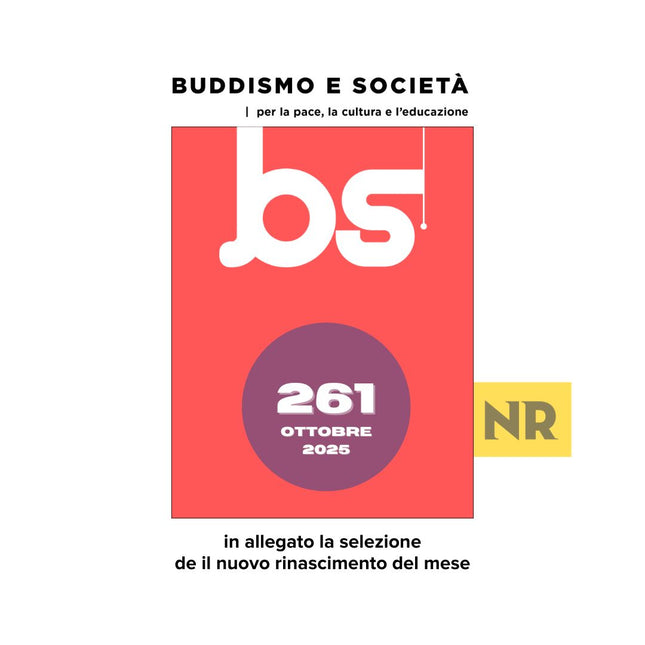
€4,50
-
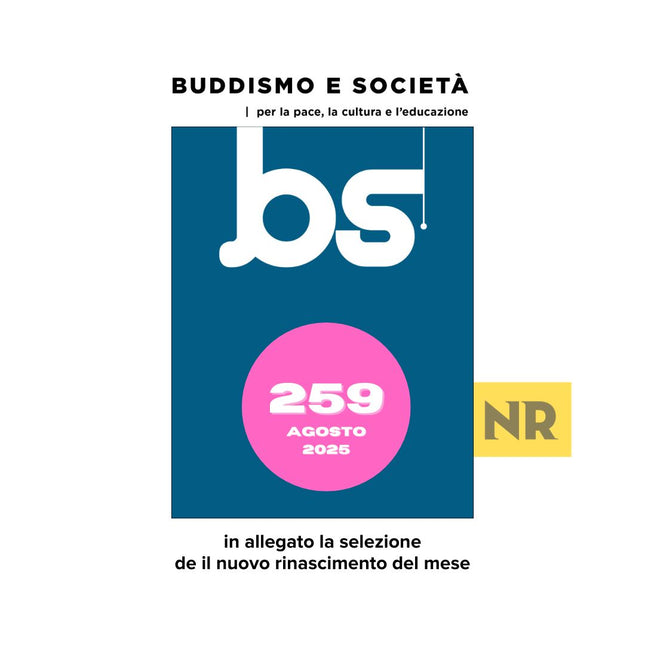
€4,50
-
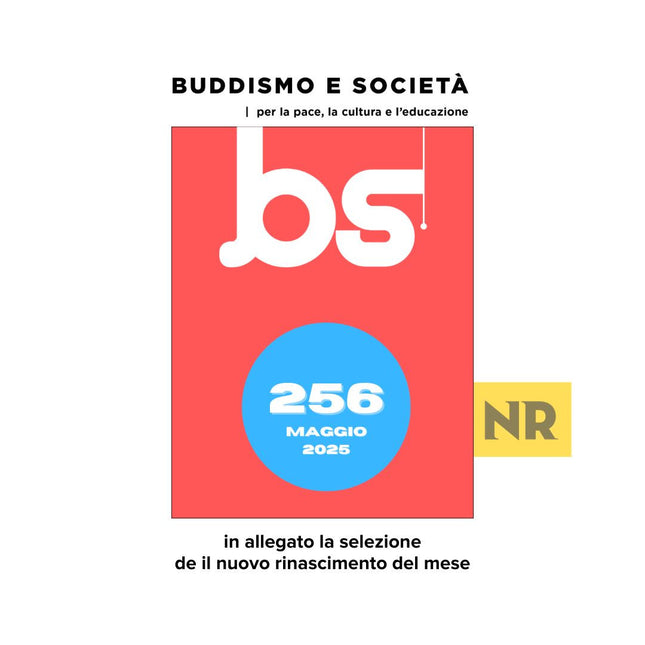
€4,50
-
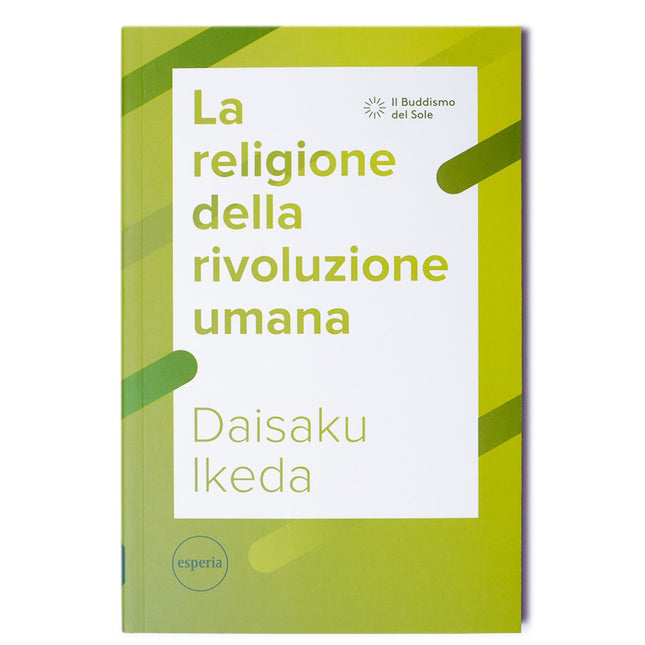
Esperia La religione della rivoluzione umana
Nelle dodici lezioni presenti in questo volume, tratte dalla serie “Il Buddismo del sole” e raccolte sotto il significativo titolo La religione della rivoluzione umana, il presidente della SGI Daisaku Ikeda delinea il profilo di una religione autenticamente umanistica, capace di permettere a ogni persona di rivoluzionare la propria condizione vitale e di contribuire a un cambiamento positivo della società, influenzando il destino dell’intera umanità. Il maestro Ikeda affronta diversi princìpi cardine del Buddismo e, partendo sempre dagli scritti del Daishonin, ci spiega cosa significhi praticare il Buddismo di Nichiren in epoca moderna e come la Soka Gakkai abbia fatto proprio il mandato del Budda di realizzare un’ampia propagazione della Legge mistica, risvegliando numerosi Bodhisattva della Terra al loro grande voto. Si tratta di preziose indicazioni del maestro, volte a garantire l’eterno sviluppo del movimento di kosen rufu. “In ogni paese o società la presenza anche di un solo membro della Soka Gakkai è il punto di partenza per creare un’epoca di vittoria delle persone”. Daisaku Ikeda
€10,00
-

Esperia Librarsi nei cieli della speranza
Stringere amicizie, cantare canzoni, leggere buoni libri, dire "grazie", nutrire grandi sogni, sorridere. In questa raccolta di saggi dedicati ai bambini e alle bambine, il presidente della SGI Daisaku Ikeda descrive questi e altri punti chiave per vivere una vita felice. Le ragazze e i ragazzi, "i tesori del futuro", potranno godere di questi semplici messaggi scritti appassionatamente per loro.
€12,00
-

Esperia L'orgoglio di essere pilastri d'oro di kosen rufu
Dedicato agli uomini della famiglia Soka. Gli alberi di ginkgo del Giappone provengono dalla Cina. Nella lingua giapponese essi vengono designati anche con alcuni caratteri cinesi che significano letteralmente “albero nonno-nipotino”, poiché se qualcuno pianta un ginkgo adesso, i frutti verranno raccolti dai nipoti. Lessi questa spiegazione tanto tempo fa e ancora ne serbo il ricordo. A me pare che questo nome voglia significare: «Non vivo per me stesso, ma per il bene delle generazioni che verranno dopo di me. Raccoglierò tutta la mia forza vitale e realizzerò grandi cose!». Quando guardo un alto albero di ginkgo, il mio pensiero va alle persone delle generazioni precedenti che lo hanno piantato e ne hanno avuto cura.
€13,00
-
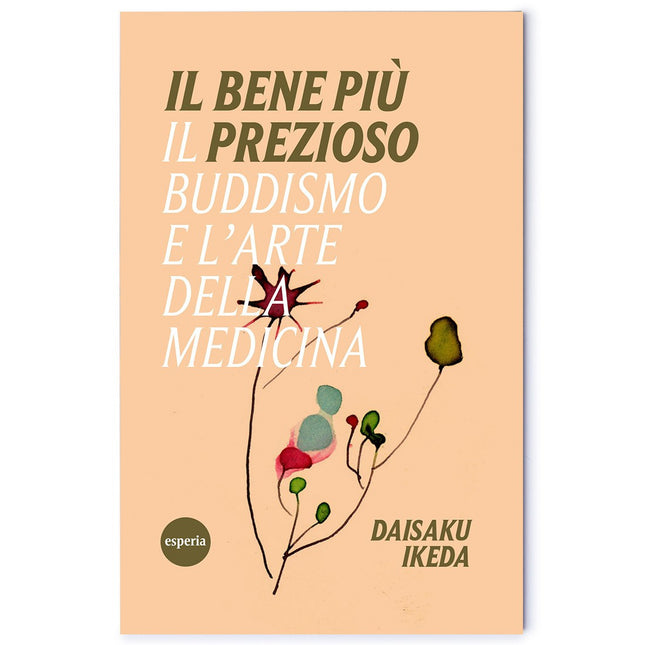
Esperia Il bene più prezioso
Il Buddismo e l'arte della medicina. La malattia è una delle quattro sofferenze della vita che secondo il Buddismo accomunano tutti gli esseri umani. L'uomo ne ha sempre avuto paura, poiché compromette la capacità di vivere appieno la vita, ma le scritture buddiste affermano che le malattie stimolano lo spirito di ricerca della "Via". Per insegnare un atteggiamento che consenta di sfidare le malattie sulla base della fede, oltre che delle conoscenze mediche, in questo volume Daisaku Ikeda discute con alcuni esperti del campo la prevenzione e la cura delle principali malattie che affliggono gli esseri umani del nostro tempo. "La salute non è una semplice assenza di malattia. Essere sani implica una sfida costante e una costante creatività. Una vita feconda, una vita davvero sana è in costante avanzamento, apre scenari sempre nuovi. Uno spirito indomito dà il potere di continuare ad andare avanti."Daisaku Ikeda
€16,50
-

Esperia Un nuovo umanesimo
Raccolta di conferenze di D. Ikeda in celebri atenei di tutto il mondo.Il volume raccoglie le conferenze che Daisaku Ikeda ha tenuto presso importanti atenei del mondo dal 1975 al 1995: frammenti di saggezza buddista che propongono una società dal volto più umano, che valorizzi l'individuo e le sue infinite potenzialità in un mondo ormai senza più confini. Sempre teso a cogliere i punti in comune tra le diverse culture e allo stesso tempo a esaltare le caratteristiche peculiari ogni popolo, l'autore cerca di creare legami, ponti di amicizia e comprensione nello sforzo costante di superare la diffidenza che divide l'occidente dall'oriente, una nazione dall'altra. Non lo fa insistendo sulla propria posizione, ma esplorando il patrimonio lasciato in eredità al genere umano dai grandi pensatori. Prendendo a prestito le parole di personaggi del calibro di Tolstoj, Gandhi, Leonardo da Vinci, Pascal o dei saggi dell'antica Cina, Ikeda è in grado di parlare la stessa lingua degli ascoltatori più disparati, una lingua comune al cuore umano.
€16,50
Hai visto 96 prodotti su 132













